Most say U.S. is reliable partner, and ratings for Biden are mostly positive – although down significantly from last year
This Pew Research Center analysis focuses on public opinion of the United States, Russia and NATO in 17 countries in North America, Europe, the Middle East and the Asia-Pacific region. The report draws on nationally representative surveys of 19,903 adults from Feb. 14 to May 11, 2022. All surveys were conducted over the phone with adults in Canada, Belgium, France, Germany, Greece, Italy, the Netherlands, Spain, Sweden, the United Kingdom, Japan, Malaysia, Singapore and South Korea. Surveys were conducted face to face in Poland and Israel and online in Australia.
Data collection began a week prior to Russia’s invasion of Ukraine in Canada, France, Germany, Italy, the UK and Japan. All other countries began fieldwork the same day as or shortly after the invasion. Due to the time it takes to translate, program and test questions on our international surveys, we prioritized gathering data at the start of this significant international event rather than delaying, or pausing, fieldwork to add questions specifically about the war or the actions taken by world leaders in response. Analysis focuses on ratings of Presidents Joe Biden and Vladimir Putin, the countries they lead and NATO as the war in Ukraine was unfolding. In this report, the data is discussed in the context of over a decade of cross-national trends.
Views of Russia and NATO also include data from the United States. We surveyed 3,581 U.S. adults from March 21 to 27, 2022, after the start of the war in Ukraine. Everyone who took part in this survey is a member of the Center’s American Trends Panel (ATP), an online survey panel that is recruited through national, random sampling of residential addresses. This way nearly all U.S. adults have a chance of selection. The survey is weighted to be representative of the U.S. adult population by gender, race, ethnicity, partisan affiliation, education and other categories.
The Pew Research Center has conducted several studies on the ATP since the start of the war to measure American’s attitudes toward Russia, NATO and the invasion. Read more about American public opinion of the war:
- Public Expresses Mixed Views of U.S. Response to Russia’s Invasion of Ukraine
- Zelenskyy inspires widespread confidence from U.S. public as views of Putin hit new low
- Seven-in-Ten Americans Now See Russia as an Enemy
- Americans’ Concerns About War in Ukraine: Wider Conflict, Possible U.S.-Russia Clash
Here are the questions used for the report, along with responses. See our methodology database for more information about the survey methods outside the U.S. For respondents in the U.S., read more about the ATP’s methodology.
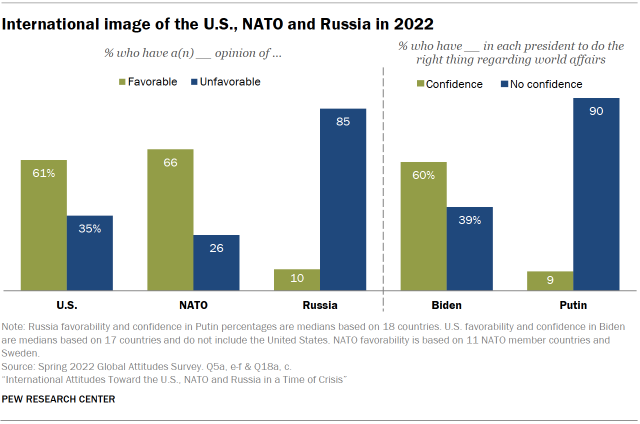
Russia’s invasion of Ukraine has brought war to Europe at a scale unseen since the 1940s. In response, the United States and its NATO allies have supplied Ukrainian defense forces with weapons and training, while millions of refugees have fled into neighboring countries. The war has been the center of international attention for months, and as a new 18-nation Pew Research Center survey shows, it has had an impact on public opinion.
Ratings for Russia, which were already negative in most of the nations surveyed, have plummeted further following the invasion. In 10 countries, 10% or less of those polled express a favorable opinion of Russia. Positive views of Russian President Vladimir Putin are in single digits in more than half of the nations polled.
Attitudes toward NATO, in contrast, are largely positive, and ratings for the alliance have improved in several nations since last year, including Germany and the U.S., as well as nonmember Sweden. Swedish attitudes toward NATO grew increasingly positive over the course of the survey’s field dates.
Meanwhile, overall ratings for the U.S. are largely positive and stable. A median of 61% across 17 nations (not including the U.S.) express a favorable view of the U.S. Still, there have been some changes since last year, with favorable opinions increasing significantly in South Korea, Sweden and Australia, while declining significantly in Greece, Italy and France.

Over the past couple of years, our surveys have found strong concerns in advanced economies about the health of American democracy. In 2021, more than half in most nations surveyed said democracy in the U.S. used to be a good example for other nations to follow, but that it no longer is. This year’s survey reveals a consensus about America’s divisive politics: Large majorities in nearly all the nations polled say there are strong conflicts between people who support different political parties in the U.S.
Large majorities in most countries see America as a reliable partner to their country, and the share of the public holding that view has risen over the past year in most nations where trends are available. For instance, 83% of South Koreans consider the U.S. a reliable partner, up from 58% in 2021.

Ratings for U.S. President Joe Biden have slipped since 2021, with confidence in the American leader dropping significantly in 13 countries, including declines of 20 percentage points or more in Italy, Greece, Spain, Singapore and France. Despite these shifts, attitudes toward Biden remain mostly positive, with a median of 60% across the nations polled expressing confidence in him to do the right thing in world affairs. Biden gets his highest marks in Poland (82% confidence) and his lowest in Greece (41%).
Data from four nations that we have surveyed consistently over the past two decades – France, Germany, Spain and the United Kingdom – illustrates the long-term pattern on views of recent American presidents in Western Europe. George W. Bush received low and declining ratings during his time in office, while Barack Obama got mostly high marks. Attitudes toward Donald Trump were overwhelmingly negative. Biden receives much more positive reviews than his predecessor, although his ratings have fallen in all four countries in year two of his presidency.
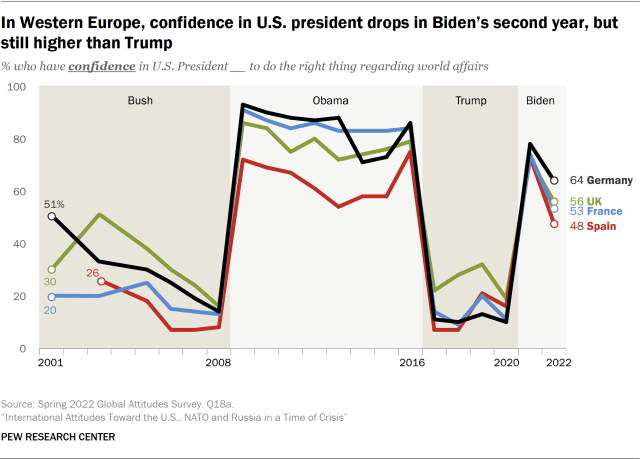
The one country in the study where Biden receives lower ratings than Trump is Israel. Six-in-ten Israelis see Biden positively, but 71% felt this way about Trump when we last surveyed there in 2019 (in 2017 56% of Israelis rated Trump positively, and in 2018 it was 69%). Israeli views toward American presidents have fluctuated considerably over the past two decades, although overall attitudes toward the U.S. have remained consistently favorable.
CORRECTION (Aug. 11, 2023): A previous version of this report misstated Spanish confidence in U.S. President Joe Biden. A chart has been updated to reflect that in 2022, 48% of Spanish adults reported confidence in Biden to do the right thing regarding world affairs.
Scope and timing of the 2022 Global Attitudes Survey
This report includes data from a survey of 18 nations: the U.S., Canada, Belgium, France, Germany, Greece, Italy, the Netherlands, Poland, Spain, Sweden, the United Kingdom, Israel, Australia, Japan, Malaysia, Singapore and South Korea. Throughout the pandemic, our international survey research has mostly focused on advanced economies where phone or online polling is available. In many regions, we typically conduct face-to-face interviews, which have often been difficult since the COVID-19 outbreak. However, for the current survey, in-person face-to-face interviews were conducted in Israel and Poland, and we are optimistic that face-to-face research will be more widely available moving forward.
Interviews were conducted from Feb. 14 to May 11, 2022, with most taking place after Russia’s invasion of Ukraine, which began Feb. 24. Due to the timelines involved in designing and executing the survey, we were unable to include questions directly measuring opinions related to the war. However, as this report highlights, we have several findings that reflect the impact of the war on public opinion, particularly regarding attitudes toward Russia and NATO.
The survey does not include questions directly measuring opinions about how Biden or the U.S. has handled the Russian invasion of Ukraine.
However, one issue leading to lower ratings for Biden could be the major foreign policy issue of summer 2021: the U.S. withdrawal from Afghanistan after two decades of having a military presence in the country. The current survey finds that on balance the publics surveyed believe pulling out of Afghanistan was the right decision, but that the withdrawal was handled poorly. And confidence in Biden is notably lower among those who say the withdrawal was not handled well. Trust in Biden has also dropped sharply among those who do not believe the U.S. is a strong partner to their country.
Biden’s high ratings in 2021 may have also reflected in part people’s reactions to a new president after Trump’s tenure, during which the U.S. president received historically low ratings in many nations. In year two of his presidency, Biden remains popular, but some of the initial enthusiasm for his presidency has waned. And the declines for Biden are larger than those for Obama during his second year in office.
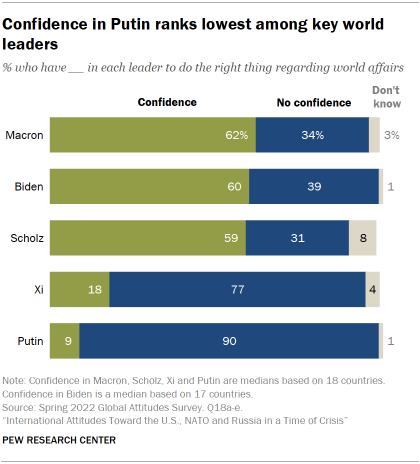
Biden’s overall ratings are similar to those for two European leaders included on the survey, French President Emmanuel Macron (a median of 62% express confidence in him) and German Chancellor Olaf Scholz (a median of 59%). There are some notable differences, however, in ratings for the three leaders within specific countries. For instance, Biden gets much better reviews than his French and German counterparts in both Poland and Israel, while Macron is easily the most popular of the three leaders in Greece. The survey, which was conducted while the French presidential election was taking place, finds modest improvements in ratings for Macron in several nations. Overall, Scholz gets somewhat lower ratings than his predecessor, Angela Merkel, although this is partially due to the fact that some respondents are unfamiliar with the new German leader.
Chinese President Xi Jinping gets mostly low ratings, although majorities in Singapore and Malaysia express confidence in him. A median of just 9% have confidence in Putin to do the right thing in world affairs, with his already low ratings dropping over the past year in all countries where trends are available.
However, views about Putin have not always been so negative. Pew Research Center has been tracking attitudes toward the Russian leader for two decades, and in the early 2000s his ratings were much more positive in North America and Western Europe. For example, in a 2003 survey, 75% of Germans voiced confidence in Putin. In a 2003 phone survey, Americans were somewhat divided in their views (47% no confidence in Putin, 41% confidence). Since then, however, he has received mostly negative marks, and his ratings are at all-time lows now in every country where we have trend data. In the U.S., the partisan divide in trust in Putin seen during Trump’s administration has narrowed, with overwhelming majorities of both Democrats and Republicans now lacking trust in the Russian president.
Confidence in world leaders often differs by age, but while younger adults tend to trust Biden and Macron less than older adults, they are more likely to have confidence in Putin in a number of countries. In Germany for example, half of adults ages 18 to 29 trust Biden to do the right thing in world affairs, compared with roughly three-quarters of adults ages 50 and older. And though overall confidence in Putin is much lower, about a quarter of young Germans trust him, compared with only 10% of older Germans.
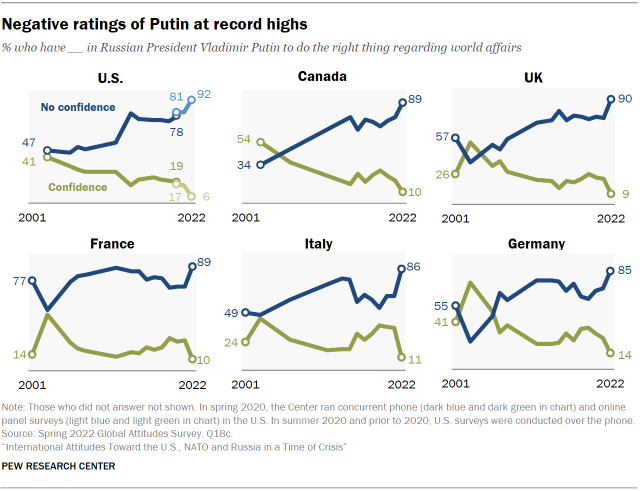
Ratings for Russia are also at all-time lows in nearly all countries in the study. Poles and Swedes stand out for the intensity of their negative views. Fully 97% of Poles have an unfavorable opinion of Russia, and 91% have a very unfavorable opinion. In Sweden, 94% express an unfavorable view, with 80% saying their opinion of Russia is very unfavorable. Malaysia is the lone exception in attitudes towards Russia, with almost half (47%) holding a favorable opinion, while 50% view Russia unfavorably.
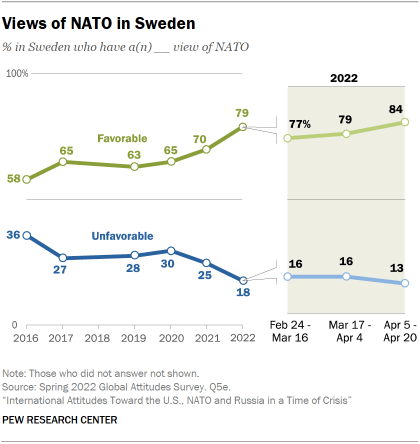
The survey includes 11 NATO member states, and views of the alliance have improved in five of those nations since 2021 (Germany, the UK, Poland, the U.S. and the Netherlands), although they have declined in two (Greece and Italy). One of the more interesting patterns regarding attitudes toward NATO is in Sweden, a long-time officially neutral country that has recently applied for NATO membership in the wake of Russia’s invasion of Ukraine. Swedish views toward NATO have been trending in a positive direction in recent years, and in the current survey, 79% give the alliance a favorable rating – the highest ever registered in a Pew Research Center poll of Sweden. Moreover, attitudes grew more positive over the course of the survey, which began in Sweden on Feb. 24, the same day as Russia’s invasion. Among Swedes interviewed between April 5 and 20, toward the end of the survey’s field period, 84% said they have a favorable opinion of NATO.
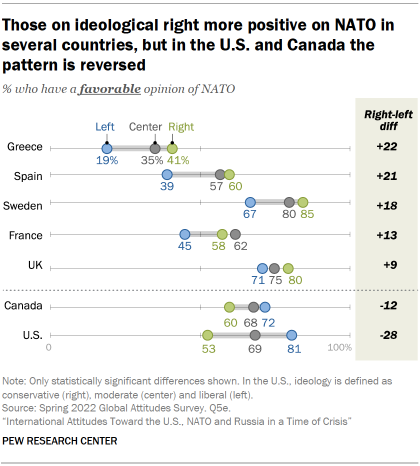
In several nations, views of NATO are more positive among people who place themselves on the right of the ideological spectrum. Among Greeks on the political right, for example, 41% have a favorable opinion of NATO, compared with just 19% among those on the left. Similar patterns are found in Spain, Sweden, France and the UK. However, in the U.S. and Canada, this pattern is reversed: Americans and Canadians on the left are significantly more likely to express a positive view of the alliance than those on the right.
In the U.S., ratings for NATO are more positive among Democrats and Democratic-leaning independents (78% favorable) than among Republicans and Republican leaners (55%), although this partisan gap has narrowed since 2021, when 77% of Democrats and 44% of Republicans gave the alliance positive marks.
These are among the major findings of a new Pew Research Center survey, conducted from Feb. 14 to May 11, 2022, among 23,484 adults in 18 nations. The analysis of attitudes toward the United States excludes data from the U.S. The analysis of views about NATO includes data from 11 member states plus Sweden. All 18 nations are included in the sections on views about Russia and international leaders.


